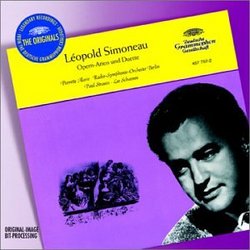| All Artists: Georges Bizet, Francesco Cilea, Domenico Cimarosa, Gaetano Donizetti, Charles Gounod, Fromental Halevy, Jules Massenet, Etienne-Nicolas Mehul, Giacomo Puccini, Ambroise Thomas, Giuseppe Verdi, Lee Schaenen, Paul Strauss, Berlin Radio Symphony Orchestra, Pierrette Alarie, Léopold Simoneau Title: Léopold Simoneau: Opera Arias & Duets Members Wishing: 0 Total Copies: 0 Label: Deutsche Grammophon Release Date: 2/13/2001 Genre: Classical Styles: Opera & Classical Vocal, Historical Periods, Classical (c.1770-1830) Number of Discs: 1 SwapaCD Credits: 1 UPC: 028945775227 |
Search - Georges Bizet, Francesco Cilea, Domenico Cimarosa :: Léopold Simoneau: Opera Arias & Duets
 | Georges Bizet, Francesco Cilea, Domenico Cimarosa Léopold Simoneau: Opera Arias & Duets Genre: Classical
|
Larger Image |
CD Details |
CD ReviewsTenor-lovers Alert! song junkie | Smyrna,, Georgia USA | 02/24/2001 (5 out of 5 stars) "For some of the most beautiful lyric tenor singing available on a disc, please sample this recent release on DGG.Mr. Simoneau's recording are few and this one is particularly fine in its aria selection and the singing is simply above reproach.This is a lyric tenor voice in the style of Schipa. Should you have doubts, listen closely to the aria "Una furtiva lagrima" from Donizetti's opera L'elisir d'amore. The pitch is perfect, the line is firm and the voice is beautiful in it tonal quality. The duet from Faust is sung lovingly and phrased to perfecton by this husband and wife vocal team, a feast of simple lyric beauty. There are no fillers on this disc. Every duet and aria is a winner and I should perhaps note that since Mr. Simoneau's French diction is flawless, the arias from operas by Mehul and Halevy are particularly welcome. As a footnote, I should like to add that if you are able, find a copy of Simoneau's recording of the "Sanctus" from the Berlioz Requiem with Munch and the Boston Symphony. It makes all recorded competition sound amateurish." A voice of rare beauty, used with restraint Ralph Moore | Bishop's Stortford, UK | 05/31/2010 (4 out of 5 stars) "To get the obvious out of the way first: Simoneau possessed a lyric tenor of rare beauty and homogeneity of tone throughout its range, more of a "tenore di grazia" in the Italian repertoire and in French opera the kind of graceful, Gallic voice now virtually extinct; he could happily alternate between the two, sounding comfortable in both traditions. Of course, as a French-Canadian, presumably his sung French was perfect (it sounds it to me) and he had the happy fortune to be married to, and share his career with, a light, pure soprano whose voice beautifully matched his own - and Pierette Alarie partners him prettily in four excerpts.
There are several tracks here which demonstrate the surpassing elegance of Simoneau's gifts, particularly in the French operas "Manon", "Les Pêcheurs de perles" and "Faust". Having said that, even in those, the most pleasing features of this disc, I was sometimes aware of a certain restraint bordering on blandness in Simoneau's characterisation. In the famous "Manon" with de los Angeles, Henri Legay manages to do much more, dramatically, with somewhat less voice, to involve the listener in Des Grieux's torment. Nor do I think some of Simoneau's choice of repertoire to be especially wise: his version of "Rachel, quand du Seigneur" inevitably invites invidious comparisons with bigger-voiced tenors such as Caruso and Tucker who had the resources to snarl and thrill us with the climactic "C'est moi". No, this aria should not be delivered in verismo style, but once heard with more passion than Simoneau can summon up, it's hard to concede that his style is preferable. He is definitely stretched by "O, mon père" and a slight crack should have resulted in a re-take. Similarly, should he really be venturing into Cavaradossi territory with "E lucevan le stelle"? The climactic A is hardly - er -climactic. So as much as I admire this valuable singer, I still think this recital to be a mixed bag. It matters little that the second half lapses from stereo into mono - the sound is clear and crisp - but certain items are certainly much more impressive than others, mainly by virtue of their suitability to Simoneau's voice type. It is especially pleasant to hear that lovely classical aria "Champs paternels" from Méhul's "Joseph en Egypte", once a staple number in tenor recitals, but even here rather stodgy tempi for the opening section mean that memories of John McCormack's peerless acoustic version are not erased. Compensation comes in the two meltingly sung arias from Thomas's "Mignon"; the kind of thing Simoneau did best. Fans of Simoneau may already have his lovely complete recordings of "Così fan tutte" under Karajan and "Orphée et Eurydice" under Rosbaud but this recital, despite my mild reservations, makes a welcome souvenir of a delightful singer." |

 Track Listings (15) - Disc #1
Track Listings (15) - Disc #1